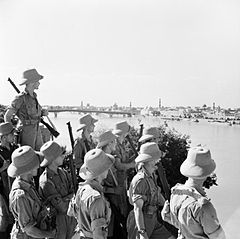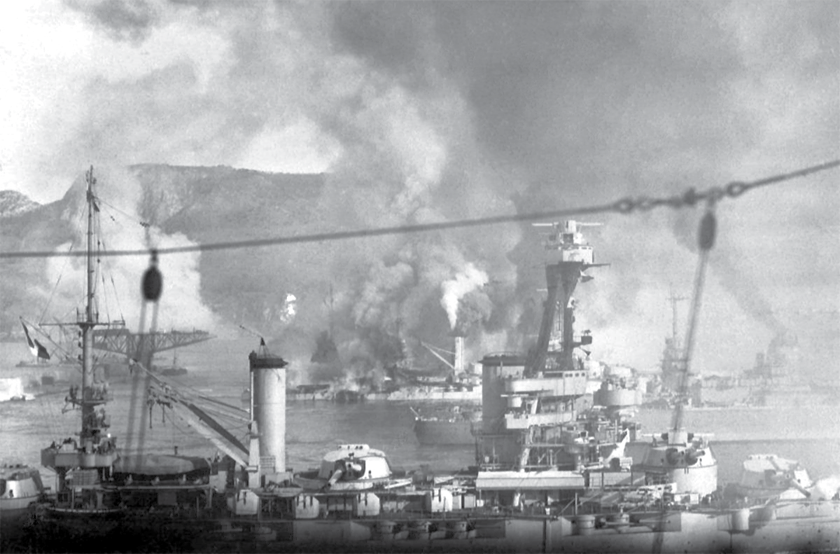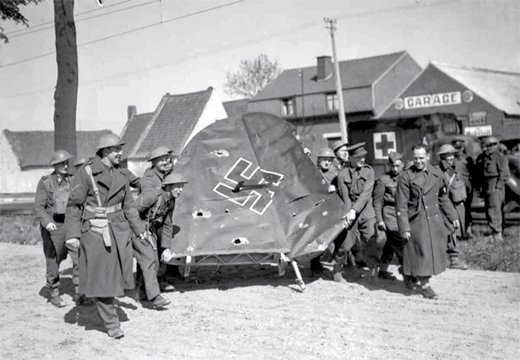
Britain in World War II: July 1940–June 1941

During the attack on Mers El Kébir, the French battleship Bretagne (in the background) was hit, its ammunition stores soon
exploded, causing the vessel to sink immediately. 977 French officers and sailors died on board.
After the fall of France, Britain found itself in a difficult situation. It was the only country that remained at war with Germany, which occupied and controlled almost the entire continent: France, the Netherlands, Belgium, Luxembourg, Denmark, Norway, Poland, the Czech Republic, and Austria. The remaining states were allies of Germany (Italy and Slovakia) or maintained sympathetic neutrality (Hungary, Romania, Bulgaria, Finland and Spain). Portugal, Switzerland and Sweden had no choice but to trade with Germany, as they could fall victim to German aggression at any time. The USSR complied with the Non-Aggression Treaty and the Mutual Trade Agreement, supporting Germany with various types of supplies.
During the dramatic summer of 1940, Great Britain managed to defend itself against the German air offensive. The daytime air offensive gradually phased out in September 1940 and turned into nighttime harassment in October 1940. A frantic refinement of the air defense system began to more effectively counter the Luftwaffe's nighttime operations. At the same time, there was an expansion of Britain's armaments production, which still feared a German invasion, which the Germans actually abandoned in September, gradually focusing on planning and then preparing for the invasion of the Soviet Union in the spring of 1941.
Great Britain assumed a long-term wage war with Germany until a complete victory, which the country has never doubted. However, it was necessary to choose a strategy for fighting the Germans. It was obvious that on land Britain was absolutely no match for the Wehrmacht, let alone confronting its German allies at the same time. The situation seemed to be a stalemate - Germany rules the continent, but is unable to invade Great Britain due to restrictions in the field of troop transport and logistic support, lack of air control and British advantage at sea.

The victory in the Battle of Britain stopped the German invasion of the British Isles. But there was a stalemate because Britain by no means had the strength to defeat the Germans and Italians on the continent. So what to do?
In World War I, Great Britain applied the naval blockade to great effect. At that time, the Germans lacked saltpeter, mined mainly in Chile and India, which was necessary in the production of gunpowder and propellants, as well as other explosives. However, still during World War I, the Haber and Bosch method of obtaining ammonia artificially, without the need for saltpeter, was developed in Germany. Even before World War I, the German chemist Fritz Hofmann also developed a method of obtaining synthetic rubber without the use of rubber imported from South America. In the 20s, the production of synthetic rubber was started on an industrial scale, which in turn made it independent of rubber supplies. Tungsten was mainly imported from Portugal, although Great Britain made efforts to suspend these supplies, including buying up a large proportion of Portuguese production of tungsten ore. But the naval blockade still made sense, because the biggest problem for Germany was oil.
Another solution is an aerial bombing offensive against important objects in Germany. Great Britain was the second country after the United States where the doctrine of air operations developed by the Italian general Gulio Douhet was very vivid and creatively developed. The first supporter of strategic bombing was the man who was behind the formation of the Royal Air Force in 1918 - General (RAF Marshal) Hugh M. Trenchard. His views were continued by General Edgar R. Ludlow-Hewitt, commander of the Bomber Command in 1937-1940. The powerful bomber fleet was to eliminate the enemy's industry and create such harsh living conditions in the hostile country that the morale of its population would collapse. As a result, desperate people would lead to a coup and overthrow of state authorities, as happened during the First World War. It was hoped that during the next war, a bombing offensive devastating the enemy's country could lead to the same situation again.
However, the British bombing offensive developed very slowly. In 1939 and in the first half of 1940, almost no such activities were carried out, with the exception of unsuccessful attacks on German naval bases and the discharges of propaganda leaflets. The reason was the fear that Germany would suffer losses in the civilian population, which could lead to German retaliation in the form of bombing British and French cities. The British were forced to take into account French concerns, so they refrained from developing full-scale
bomb offensive.